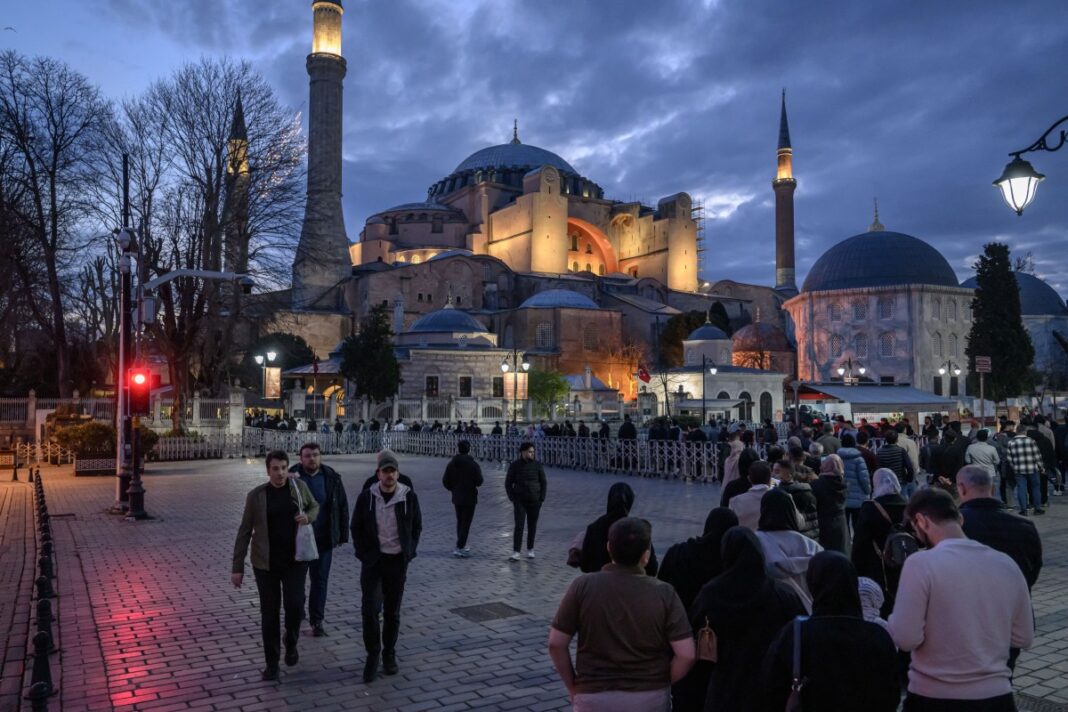With the cost of sacrifice out of reach for many households and opposition leaders facing arrests and investigations, Eid al-Adha in Turkey comes amid financial hardship and government-led political pressure.
Eid al-Adha, commonly translated as the Feast of Sacrifice, is one of the two main Islamic holidays during which the ritual sacrifice of animals such as cattle or sheep is performed by those who are able to afford it. Some of the meat from the animals sacrificed during the feast is distributed to family, friends and charities. Eid al-Adha will be celebrated by Muslims between June 6 and 9.
Rising prices have left both farmers and people who want to sacrifice an animal during Eid al-Adha in a difficult situation. Many farmers in Turkey say they have been able to sell far fewer animals for sacrifice than last year, complaining about the rising cost of raising animals, which affects their prices significantly.
Turks have been suffering from skyrocketing inflation for several years, surging to 85 percent in October 2022.
In May inflation slowed to 35.4 percent, reaching its lowest level since November 2021, official figures showed Tuesday, but the calculations of ENAG, an independent group of economists, suggested that it was in fact 71.2 percent, much higher than the official figure.
The high rate of inflation makes it difficult for Turks to meet even their basic needs.
According to Turkish media reports, the cost of sacrificial animals has surged by as much as 900 percent since 2021, putting the once-widespread tradition out of reach for millions of Turks struggling with rising food prices and stagnant incomes.
On top of the rising costs, an escalating crackdown on the country’s main opposition Republican People’s Party (CHP) that has seen dozens of elected officials and party members suspended or detained in recent months further added to the polarization in the country.
In a video message released before the holiday, President Recep Tayyip Erdoğan criticized the CHP for refusing to take part in customary Eid greetings with other political groups.
Erdoğan said the CHP had “become a party that does not wish anyone a happy Eid,” urging the opposition to abandon what he called an “insistence on error” and to contribute to national unity “especially during holidays.”
CHP leader Özgür Özel, speaking outside İstanbul’s Silivri Prison, responded by saying that “Eid has not come” for the CHP, referencing the ongoing detention of 11 elected CHP mayors.
“We are in no condition to celebrate Eid,” Özel said, accusing Erdoğan of using the judiciary to remove mayors he could not defeat at the ballot box and calling the detentions a violation of democratic norms.
İstanbul Mayor Ekrem İmamoğlu, widely seen as Erdoğan’s top political rival, was jailed in March on corruption charges that he denies, sparking the largest wave of protests Turkey has seen in a decade.
On Thursday Turkish authorities suspended five more CHP mayors from districts in İstanbul and Adana, citing corruption investigations that led to the arrest of the mayors this week.
Opposition figures claim the cases are politically motivated and aimed at weakening the CHP, especially after its sweeping victory over Erdoğan’s ruling Justice and Development Party (AKP) in the local elections of March 2024, which saw the CHP garner a plurality of the votes nationwide after 47 years.
CHP deputy Aşkın Genç said on Thursday Eid has lost its meaning for working-class families, citing dramatic increases in the cost of meat and sacrificial animals over the past five years.
Genç said the price of live cattle for sacrifice rose from 30 Turkish lira per kilogram in 2021 to 300 lira in 2025, a 900 percent increase.
“A kilo of beef now costs 490 lira,” Genç said. “With the minimum wage, you can only afford 45 kilos — and that’s before rent, bills and child expenses.”
He added that the government’s Eid bonus of 4,000 lira for retirees is not enough to buy even a share in a sacrificial animal, let alone afford meat for the holiday table.
“Millions of families can’t even smell meat today,” he said. “The problem lies not with the citizens but with those in power.”
Charity groups organizing Eid al-Adha donations abroad show that Turkey shares the top tier with Lebanon and Syria just after Gaza with sacrificial animals costing 420 euros in the three countries.
The Eid market has become, in Genç’s words, a “display for the wealthy,” where millions of low-income Turks are left watching from the sidelines.
Over the past several years Turkey has been suffering from a deteriorating economy, with high inflation and unemployment, as well as a poor human rights record.
Erdoğan is criticized for mishandling the economy, emptying the state’s coffers and establishing one-man rule in the country where dissent is suppressed and opponents are jailed on politically motivated charges.
International observers have raised concerns over Turkey’s increasing repression of political opposition, warning of democratic backsliding and growing authoritarianism.
Human rights groups say the ongoing detentions of opposition mayors and journalists reflect a broader pattern of judicial abuse and censorship.
The CHP has vowed to continue protesting what it calls “a system of lawlessness,” while maintaining its boycott of formal holiday greetings until the release of jailed officials.
Özel said the party refuses to legitimize a political environment where “innocent people are left behind bars,” adding, “May no one ever experience the kind of holiday we are living through today.”

